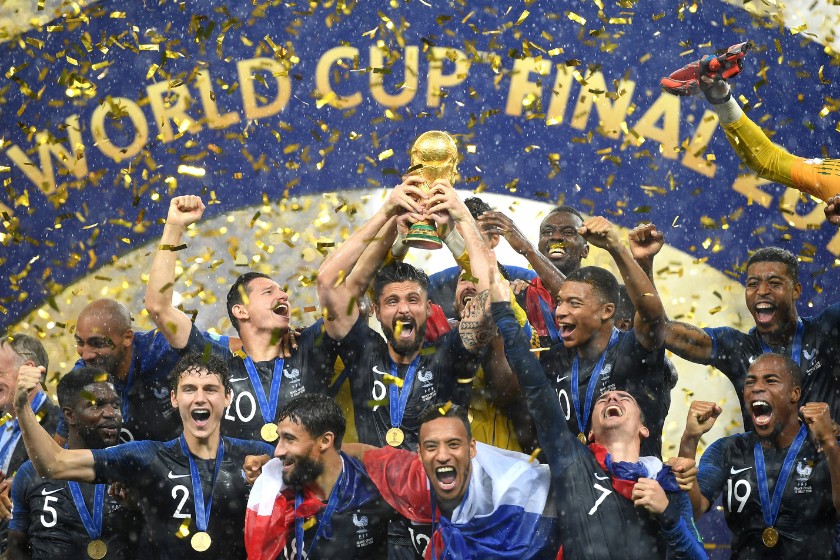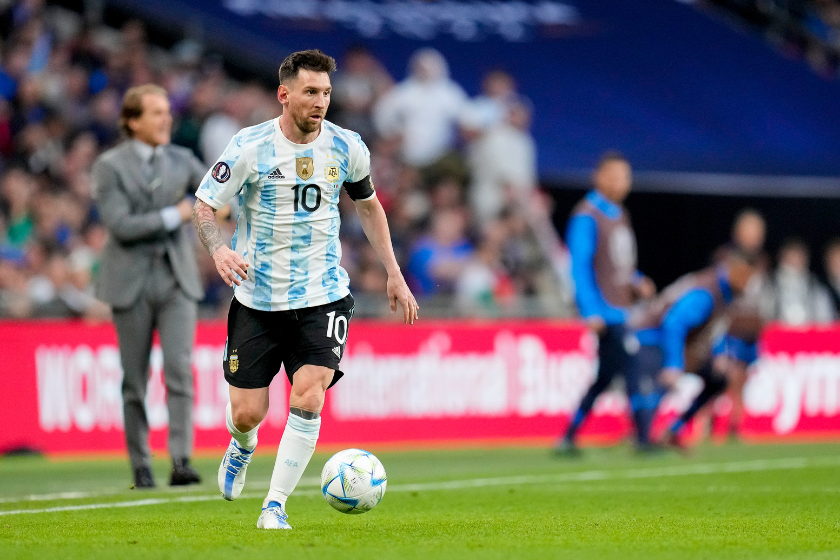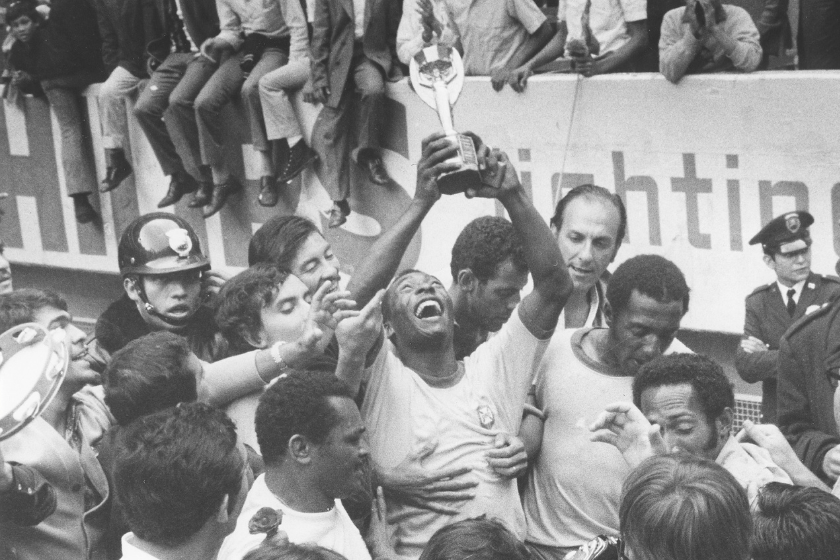The FIFA World Cup 2022 in Qatar is already historic. It will be the first World Cup held in the Arab world, and only the second in Asia after South Korea and Japan hosted the competition in 2002. This will be the first — and hopefully last — time the World Cup is not held in the summer months, and the schedule will be condensed to accommodate the brutal Qatar heat as well as regular club seasons, with the World Cup Final coming just 29 days after the host country and Ecuador play the first group stage match.
Videos by FanBuzz
After this, the World Cup field will switch to a 48-team field, making this the last with 32 national teams representing. Along with this, there's plenty of potential for history on the pitch. Never before in World Cup history has there been a 20-year span with six different countries hoisting the World Cup trophy. That could change this year.
The Previous Winners

Photo by Matthias Hangst/Getty Images
RELATED: PSG x Jordan: Collaborative Culture Across Continents
Starting with the most recent 2018 FIFA World Cup which was won by France, the previous World Cup winners were Germany (Brazil), Spain (South Africa), Italy (Germany), and Brazil (Japan/Korea).
Immediately, we can remove Italy as a potential world champion, as the current UEFA champions of Europe did not make it past qualifying for this year's tournament. That leaves the winners of the last three World Cup tournaments and Brazil — the current No. 1 in FIFA's world rankings — to play spoiler of history. It would appear the odds favor the other 28 national teams in the World Cup groups, but only eight countries have ever tasted glory after the final match. Of those eight, only Italy isn't present in this year's tourney.
Argentina, England, and Uruguay could keep the total number of countries to win the same while also helping to make history with a sixth different champion in a 20-year span. Both Argentina and England are ranked in FIFA's top 5 at third and fifth, respectively, with the side from South America hoping it can get forward Lionel Messi a World Cup title.
England is as strong as it's ever been in modern history, though it is rather banged up heading into the break. It also faces a very difficult test in the Group Stage with the United States, Wales, and Iran.
The 2014 runner-up, Argentina, has an equally challenging group featuring Saudi Arabia, Mexico, and Poland. But it likely will get a boost knowing this is probably the last chance the great Messi has to win it all. Uruguay has the easiest path, with South Korea, Ghana, and Portugal as its Group H opponents.
France will look to repeat as champion as the fourth-ranked FIFA nation. After its 2018 World Cup final win at Luzhniki Stadium in Moscow — and with perhaps the easiest group of the bunch — it looks to be in prime position to achieve that feat, which hasn't happened since the field expanded beyond 16 teams. That leaves Spain and Germany, which are both in Group E along with Japan and Costa Rica. Germany will have to deal without star scorer Timo Werner.
The Rest Of The Field

Photo by Alex Gottschalk/DeFodi Images via Getty Images
RELATED: Lionel Messi's Insane Car Collection Rivals that of Cristiano Ronaldo
So who among the rest of the field will have the best chance of making sure history is achieved? Belgium is likely to be a heavy favorite, with its No. 2 ranking and loads of star power. It will have to deal with a sneaky-good Canada side in their group, as well as Morocco and 2018 runner-up Croatia, which itself must be counted as a potential winner. The strongest United States team in a long time will likely garner belief here at home, but the Women's World Cup this is not.
As with Messi and Argentina, this is likely the last chance for Cristiano Ronaldo to lead Portugal beyond the semifinals, as they look to better their previous best third-place finish.
Could the home nation pull out a surprise win? It's unlikely. Qatar's qualification as host nation is only its first World Cup appearance, which almost kept Australia out of the tournament.
The Netherland is the only other country not previously mentioned to make it to the FIFA World Cup Final, and it will look to emerge from Group A on the path to glory. It's also possible we see a new challenger approach, with Poland entering the World Cup via Group C — with Golden Boot winner Robert Lewandowski — after a win over Sweden and with Russia being disqualified from the UEFA playoffs.
A Look to the Past

Photo by Horstmüller/ullstein bild via Getty Images
RELATED: Remembering Brazil's Magical World Cup Run with 17-Year-Old Pelé
Why haven't we seen six different winners in consecutive World Cups? Good question. A lot of it has to do with individual player dominance and a little bit of geopolitical shifting. Player dominance is an easy one, as Pele led Brazil to three World Cup wins in four tournaments from 1958 to 1970, hosted by Sweden, Chile, and Mexico. The 1958 World Cup saw South America regain its status as a football giant, after Germany defeated Hungary in 1954, unseating Uruguay as the reigning champion. Pele's Brazilian side defeated Sweden, Czechoslovakia, and Italy to capture its titles, with each team being led by the world-famous soccer star.
Geopolitically, the 1974 World Cup — hosted by West Germany — meant that the divided nation had two teams participating: West Germany and East Germany. Notably missing from the 1974 World Cup? France, Switzerland, and Belgium. West Germany would go on to win, defeating Sweden in the quarterfinals and then passing through Poland to face the Netherlands in the final match. If the Dutch side had been able to tie up the game in extra time, it's possible we could have had our first six-team win streak, but instead West Germany became the fourth host to win the World Cup on its own soil.
However it goes, there is no sporting event like the World Cup, and this iteration of the storied tournament is in uncharted waters. It's not a stretch to believe a different football team will be crowned as a first-time champion.
